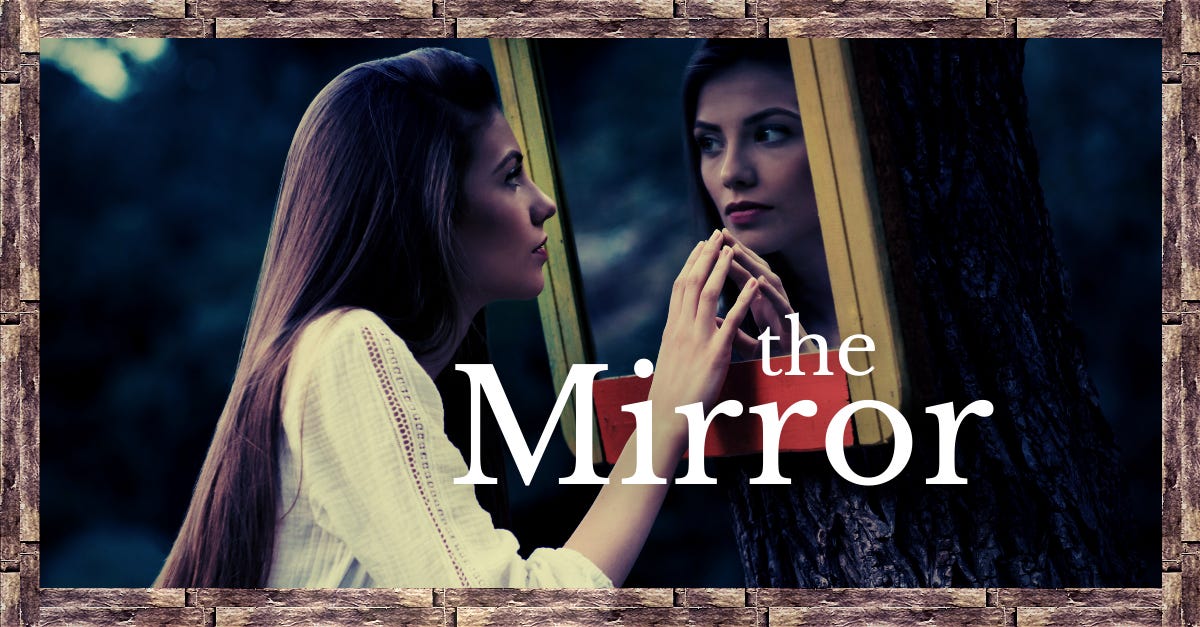Life Without Mirrors
Imagine if there were no such thing as a reflection.
We would have to puzzle together interpretations of sensory information to craft any image of appearance.
For some of us, standing in front of a mirror is the closest we come to seeing ourselves.
We recognise the image as “me” in reverse.
When you stare into a mirror, is the portrait image reflected truly “you”, or are “you” the on-looker imagining that image? Is our appearance a mirage of the self?
And so endlessly, I loathe that glass that claims it knows my frame yet neglects my frame of mind. It claims me of my looks yet deprives me of my eye. Endlessly I want my mirror. I need to see what they see. I need to see if I'm real.- GodArt
Does Finding Myself, Mean I’m Lost?
When you stare at yourself in the mirror, you are experiencing a connection between your inner and outer self.
Our mind is creating something of a two-dimensional illusion that appears trapped within the mirror.
Try the exercise of staring in the mirror, deep into your eyes. It can feel confronting, it might make you crack a smile, or it may even become too much to bear.
You might notice that there is a constant change in perception.
All you need to do is move your head to get a completely different perspective of your reflection.
The lighting may change your skin tone; the angle of the mirror or your eyes might distort your features.
What Do You See?
Your inner nature is the defining factor that dictates what you see in yourself and what you project outwardly.
Your beliefs and story are reflected outwards to the world, changing the way you perceive yourself and also others.
As such, a melancholy person will decide to see sadness, while a joyful person will choose to see happiness reflected.
You Cannot See Yourself.
Your mental self-image is an allusion of your character and values.
We assign static values, in a body, where change is fundamental-Creating a fictional character in our imaginary plot. Clinging to several self-described and prescribed traits, and our associations with material possessions.
We even let the opinions of other shape who we think we are.
Charles Cooley described our internal character descriptions by stating "I am not what I think I am, and I am not what you think I am. I am what I think you think I am."
Self-reflection is particularly challenging at a young age because events and experiences can stick in our minds and define us for the rest of our lives.
Life feels more impactful because if you are 10, one year is 10% of your entire life.
Young people want to feel good at something, and if they try it for a short time, they often feel discouraged and pass up a hobby or passion that would have suited them well had they only stuck with it.
Admitting defeat too early is even more apparent now that kids can compare themselves to millions of other people using the internet.
They did not see themselves as excellent or proficient, so they give up when they become harshly critical of their "talent." They start to use words like “I can’t” that negatively impact their self-image.
What makes us even more desperate is that it is hard to recognise our growth.
Acknowledging progress, however small, is one of life's significant challenges.
We live our day to day life without much context for the past months and years.
We struggle to see our growth, especially when we compare ourselves to others, and as a result, we quickly become disheartened and give up.
It leads us to craft a fictional story about ourselves that becomes destructive and harmful.
Who is The Person I Call “Myself”?
The answer to “who you are” will depend on who you ask.
You are probably perceived differently by each person you engage with and meet.
Maybe you are a mother, a daughter and a wife.
One person on the street sees you as kind for picking up litter, while the person behind you in traffic hates you for not waving when they let you in the lane.
All the people you interact with, see you as a different character, based on the angle from which they see you.
Another important characteristic description is that we too, define ourselves based on our perception.
You judge yourself for the things you do and don’t do.
Who are you in your mind? What is your concept of "me" and your perception of I and my? Do you treat yourself with love, or are you unkind to your mind?
A Mirror Can Only Show You What You See.
The mirror will show you a reflection that can reveal harsh truths about your way of thinking and defining your self and the world.
You are the one who sees and creates the mirage; you are not the image itself.
You have the power to define values and beliefs based on your personal perception.
No one can tell you who you are. Others can perceive you, but they cannot define you.
Only you have the power to craft youself into the person that you want to become.
It is best to reward yourself and be kind to your mind along the way as you do your best to grow and challenge yourself.
The definition of who you are is a decision you will need to make. Only you can write the story of your self-image.
If you (or your perception) enjoyed this article, please consider subscribing for weekend wisdom in your inbox.
Sources
GodArt - Real Mirror




